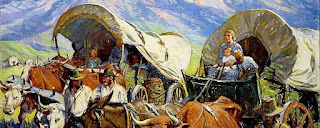For the current story I’m writing titled Cadi, I’ve been researching travel on the Oregon Trail. Not only have I read The Prairie Traveler, a manual that helped travelers prepare for the trek (and became a bestselling book), I’ve also read firsthand accounts of people who made the journey. The thing I found most interesting was the differences in the type of personal observations.
 |
| Madonna of the Prairie by William H.D. Koerner--an idealized portrait |
Men related details about the terrain, weather, geographic locations, and miles covered each day. They discussed if any special precautions were undertaken at river or creek crossings. Women counted gravestones, worried about the health of their children, and often fretted about ever reaching the destination. They weren’t wrong to do so because few families ended the journey without suffering a loss of some type. From the women’s journals emerged a common complaint: none of them initiated the trek. All would have been happy to remain in their east-of-the-Mississippi-River homes and work a bit harder to get ahead.
 |
| Oregon trail reality courtesy of Center of the West museum Notice the mismatched mule & ox team in right wagon |
But because of the times they lived in, they had to accede to the wishes of their husbands who were the recognized heads of the households. They had to leave behind their friends and families (and often the majority of their cherished household furnishings) and embark on a promised four-month trip that often expanded to six months due to unforeseen circumstances. For these women, they drove ox or mule teams or trudged across prairie grass for most of the sunlit hours, always looking forward to the time after the evening meal when they might have a few minutes to talk with other women. The trip was only make bearable by reestablishing what they knew--gathering with other women to share the stories of where they’d lived, what their lives had been like, and to speculate on what life would be like in their new homes. They clung to the familiar in a world they didn’t understand.
The McCully Train-Iowa to Oregon 1852 by Sanford R. Wilbur & Sally H. Wilbur
The Prairie Traveler by Captain Randolph A. Marcy
Westering Women and the Frontier Experience 1800-1915 by Sandra L. Myres
Women’s Diaries of the Westward Journey by Lillian Schlissel
After her father betrayed her trust by gambling away their Kentucky horse breeding business, Cadi Gruffyn salvaged the pregnant prize mare gifted for her 21st birthday. The loss of the horse farm displaces her aunt and uncle, so Cadi joins them on a wagon train to northern California where her brother established a ranch in the Diablo Valley. When her uncle dies, several men approach Cadi, insisting she needs a husband to help her finish out the trip. She refuses, afraid they only want to claim her valuable mare.
Carpenter Trynt Pembroke just wants a fresh start. A week before his wedding, he was betrayed by his fiancée who ran off with his brother. He’s looking to get as far away as he can and start a new business. As much as he doesn’t want the complication of a woman in his life, he keeps coming to the rescue of strong and determined Cadi, a woman who shares his cultural heritage. Can he convince her they are stronger together than on their own?
Visit the April Facebook Launch Celebration on April 27th to learn more about the story and read about other titles. Prizes are offered by multiple authors. Click to join event

Thank you for posting on facebook that you had your post up. This sounds so good as I used to live in Ca and on several vacations went up to Oregon and often thought about those who were here many many years ago. Although in the background of my thinking I heard all those logging trucks! peggy clayton
ReplyDelete